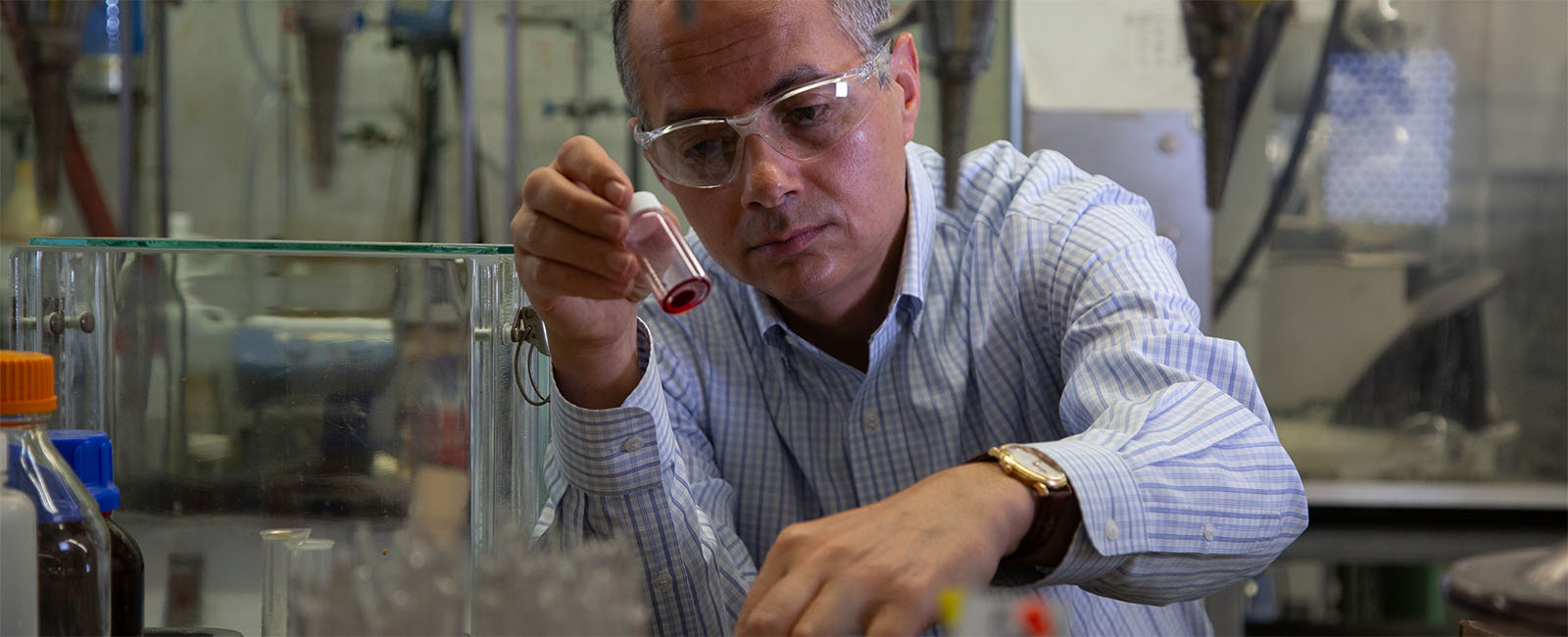
The Nobel Prize in Chemistry goes to Omar Yaghi, winner of the Frontiers of Knowledge Award in 2017
Omar Yaghi, winner of the BBVA Foundation Frontiers of Knowledge Award in Basic Sciences in the 10th edition, was announced today as joint winner with Susumu Kitagawa and Richard Robson of the 2025 Nobel Prize in Chemistry. The committee distinguished the three for the development of metal-organic frameworks, structures composed of metal ions and carbon-based molecules with applications including the capture and storage of carbon dioxide and water from air.
8 October, 2025
Yaghi, a Professor of Chemistry at the University of California, Berkeley, has obtained the Swedish award alongside Kitagawa (Kyoto University, Japan) and Robson (University of Melbourne, Australia) for developing “a new form of molecular architecture,” according to the committee’s citation. “In their constructions, metal ions function as cornerstones that are linked by long organic (carbon-based) molecules. Together, the metal ions and molecules are organised to form crystals that contain large cavities. These porous materials are called metal-organic frameworks (MOF). By varying the building blocks used in the MOFs, chemists can design them to capture and store specific substances. MOFs can also drive chemical reactions or conduct electricity,” the citation states.
Heiner Linke, Chair of the Nobel Committee for Chemistry, said that “metal-organic frameworks have enormous potential, bringing previously unforeseen opportunities for custom-made materials with new functions.”
In 2017, Yaghi received the BBVA Foundation Frontiers of Knowledge Award in Basic Sciences “for his pioneering work in the conception and synthesis of new crystalline materials, MOFs and COFs, of major impact in science and engineering,” according to the committee, with potential applications that extend to “the capture and storage of carbon dioxide (CO2) and trapping water molecules in air to produce water for drinking.”
The dream of building custom-made materials to tackle key environmental problems
“When I was a student,” – he explained in an interview about the Frontiers of Knowledge Award – “making new materials involved simply mixing stuff together and what you got at the end was what nature gave you, so there wasn’t much control over what came out. But I realized there must be a lot of potential in being able to assemble units together like you would the components of an automobile. It was a dream for me to be able to make materials in that simple, rational way. To have control over what you are creating and being able to tweak it and modify it after you have made it is really quite powerful.”
Yaghi’s dream was the seed that produced the new chemistry now sweeping the world, with hundreds of laboratories eagerly pursuing fresh applications for these porous materials. In 2017, the laureate had already counted, he said, “more than 60,000” varieties of developed MOFs.
He selects three from among the vast array of potential applications. One is carbon dioxide capture, as MOFs can seek out CO2 and separate it to prevent it from reaching the atmosphere with no need to use toxic compounds in the process. Another application is the use of molecular sieves to trap water molecules in air, even with less than 20% humidity, and deliver liquid water with no other energy input than ambient sunlight. Also relevant is the possibility of storing hydrogen in far smaller vessels than are traditionally required, lodging its molecules in the pores of the MOFs. According to Yaghi in 2017, this technique represented a direction of promise for developing a clean, hydrogen-based fuel for vehicles.
32 Frontiers awardees have gone on to win the Nobel Prize
The award of the Nobel in Chemistry to Omar Yaghi makes a total of 32 Frontiers of Knowledge laureates that have later won the Nobel Prize.
Twelve Frontiers awardees have gone on to receive the Nobel Prize in Economics: Lars Peter Hansen (2013), Jean Tirole (2014), Angus Deaton (2015), William Nordhaus (2018), Abhijit Banerjee and Esther Duflo (2019), Paul Milgrom and Robert Wilson (2020), David Card (2021), Ben Bernanke (2022), Claudia Goldin (2023) and Daron Acemoglu (2024).
In the case of the Nobel Prize in Medicine, six Frontiers laureates were subsequently distinguished by the Swedish Academy: Shinya Yamanaka (2011), James P. Allison (2018), David Julius and Ardem Patapoutian (2021) and Katalin Karikó and Drew Weissman (2023).
The Nobel Prize in Physics has found its way to seven previous Frontiers awardees: Didier Queloz and Michel G. E. Mayor (2019), Klaus Hasselman and Syukuru Manabe (2021) Ferenc Krausz and Anne L’Huillier (2023), and Geoffrey Hinton (2024).
Finally, in the case of the Chemistry Nobel, the Swedish Academy has recognized the work of seven Frontiers awardees: Robert J. Lefkowitz in 2012, Emmanuelle Charpentier and Jennifer Doudna in 2020, David Baker, Demis Hassabis and John Jumper in 2024, and Omar Yaghi in 2025.

